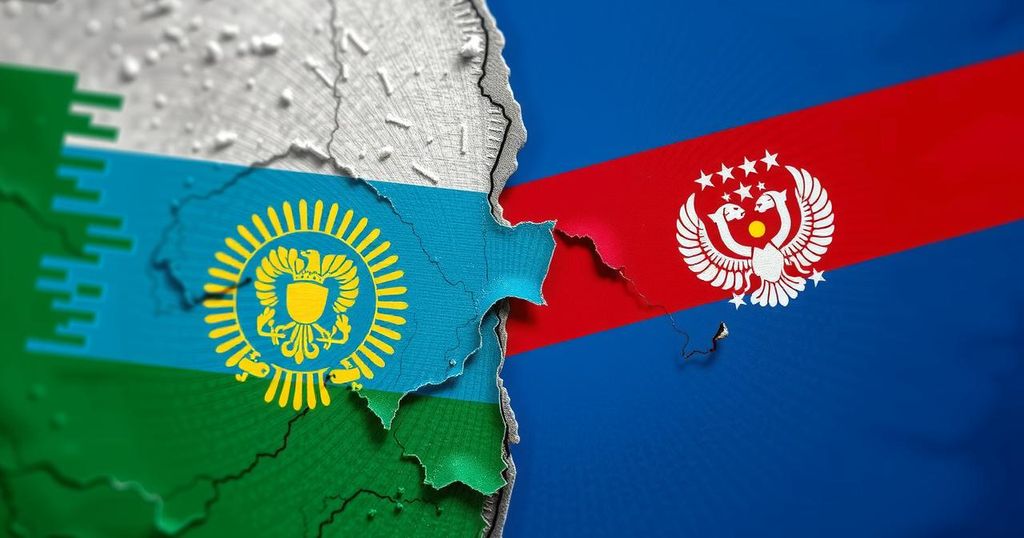Kazakhstan and Uzbekistan’s Strategic Pivot: Resisting Russian Coalition-Building
Kazakhstan and Uzbekistan have chosen not to join BRICS and the EEU, respectively, marking a significant diplomatic shift in Central Asia. Both nations are emphasizing their sovereignty and reassessing their relationships with Russia in light of geopolitical changes following the Ukraine invasion. Their decisions indicate a preference for maintaining independence while exploring other international avenues for cooperation.
In the wake of the 16th annual BRICS summit, both Kazakhstan and Uzbekistan have recently demonstrated a marked reluctance to deepen their political ties with Russia, reflecting a significant reevaluation of their diplomatic alignments. Despite Moscow’s attempts to bolster its standing in Central Asia, Kazakhstan opted not to pursue full membership in BRICS, choosing instead to maintain its observer status. Similarly, Uzbekistan has withdrawn from actively seeking membership in the Eurasian Economic Union (EEU), emphasizing its need for further preparation before such a commitment. These decisions illuminate a broader strategy among Central Asian countries to navigate the complexities arising from Russia’s invasion of Ukraine and the associated international sanctions that have since ensued. Both nations continue to maintain cordial relations with Moscow, yet their recent actions signal a desire to assert greater sovereignty and independence. Kazakhstan’s leadership has articulated its preference for the United Nations as a fundamental platform for international diplomacy, revealing a cautious approach to alliances that could alienate Western partners. President Qasym-Zhomart Toqaev’s spokesperson recently indicated that Kazakhstan would not pursue BRICS membership due in part to the uncertain benefits it perceives from such an association. In Uzbekistan’s case, the decision to remain an observer in the EEU was underscored by extensive evaluations of the bloc’s relevance and efficacy. Uzbek officials have pointedly remarked that Kazakhstan has not derived significant advantages from its EEU membership, thus justifying Tashkent’s hesitance. This collective pivot away from deeper integration with Russian-led initiatives suggests a conscious and strategic maneuvering by both nations, amid a broader geopolitical discourse that emphasizes the need for national sovereignty and identity in an increasingly multipolar world.
The geopolitical landscape in Central Asia has undergone significant shifts amidst the backdrop of Russia’s military actions in Ukraine. Historically, Central Asian countries, including Kazakhstan and Uzbekistan, have held a degree of loyalty towards Moscow, which is reflected in their participation in organizations such as the CSTO and the EEU. However, the ramifications of international sanctions and the complexities of post-invasion diplomacy have prompted these nations to reconsider their affiliations and approach towards regional cooperation. In this context, the recent decisions by Kazakhstan and Uzbekistan not to advance closer ties with Russia’s BRICS and EEU illustrate a careful recalibration of their diplomatic postures. This pivot is motivated by a desire to assert sovereignty and maintain beneficial relationships with Western partners while mitigating potential fallout from increased Russian concomitance.
The recent decisions made by Kazakhstan and Uzbekistan to refrain from joining the BRICS and EEU respectively underscore a significant diplomatic shift in Central Asia. Both countries are actively seeking to assert their sovereignty while navigating complex geopolitical realities influenced by Russia’s ongoing conflict with Ukraine. Their reluctance to deepen ties with Russian-led initiatives highlights a preference for a more independent diplomatic strategy, prioritizing national interests and security in a changing international landscape. This trend may continue as Central Asian nations strive for greater autonomy amidst pressures from traditional alliances with larger powers.
Original Source: www.rferl.org







Post Comment